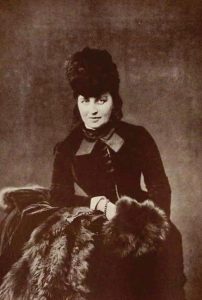Who was Olga Novikoff?
She may be described, in neutral terms, as a Russian political writer on Russian government policy. Born Kireev into a Slavophile family in 1840, she began traveling to England in her early thirties, where she would stay for months at a time. After her younger brother was killed in the Serbian war in 1872, she began composing political essays and publishing them in British newspapers, at first signing them demurely as “a Russian Lady,” then with her initials “O.K.,” and finally with her full name. Without formal education in political theory or rigorous training in government policy, Novikoff aspired to present the Russian official point of view to the British reading public, thereby earning a variety of epithets:
A writer on Russian policy, a publicist, a cosmopolitan Pan-Slavic lobbyist, a femme politique, a brilliant Russian woman,1 one of the most interesting women in Europe, one of the most cultured of Russian ladies, a Russian socialite, a Russian nationalist oligarch, that redoubtable Russian patriot, an orthodox Russian without any sympathy with revolutionary Russia,2 a Portia à la Russe,3 a Russian siren,4 and—perhaps the label that stuck most—an M.P. for Russia.
In this digital edition, we have collected approximately two hundred of Novikoff’s essays published in the British press between 1872 and 1925. Where available, we also provide readers’ responses, most of which tend to disagree with Novikoff, sometimes in very strong terms. These instances of public disagreement—and even the very fact that Olga Novikoff, a Russian conservative monarchist, was given a platform in British newspapers—serve as a testament to the late Victorian freedom of expression that, in Eric Barendt’s apt observation, was “weak in principle, robust in practice.”5
- “A Brilliant Russian Woman.” Chicago Daily Tribune July 11, 1892, p.6.
- Geo. A. Stephen, F.L.A. “Norwich Public Library Readers’ Guide”. Vol. VI. No. 2, March 1917, 34.
- Rozmovits, Linda. “The Wolf and the Lamb: An Image and Its Afterlife.” Art History 18, no. 1, 1995.
- “A Brilliant Russian Woman.” Chicago Daily Tribune July 11, 1892, p.6.
- Barendt, Eric. “Freedom of Expression in Nineteenth Century England: Weak in Principle, Robust in Practice.” Scandinavica 58, no. 2 (2019): 29-38.


